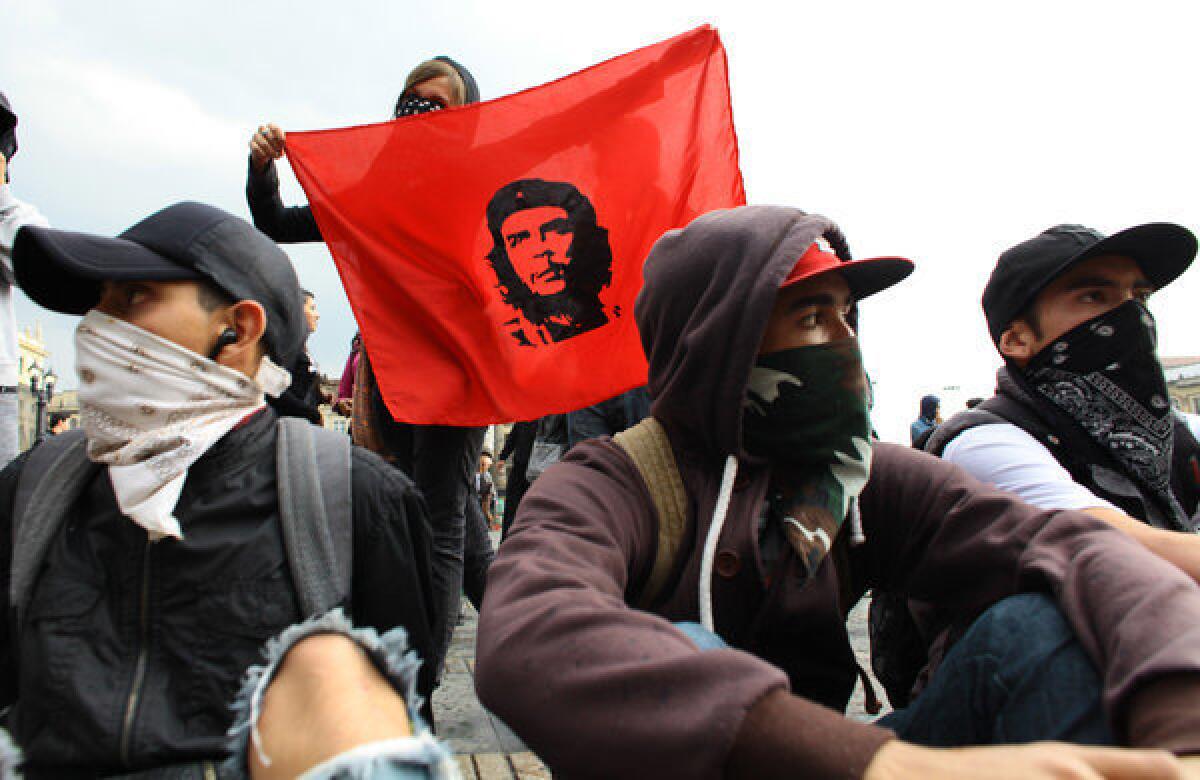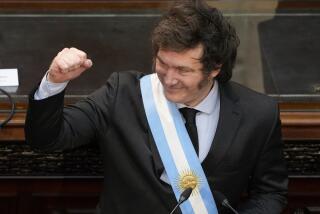Colombia rebels’ post-conflict role a key issue in peace talks

BOGOTA, Colombia — Among the many thorny issues to be hammered out in peace talks beginning Wednesday in Oslo between Colombia’s government and the country’s largest rebel group is what sort of post-conflict political role will be afforded to the insurgents.
Guaranteeing a political voice for the Revolutionary Armed Forces of Colombia, or FARC, is one of the five main issues in the talks, which are to begin in the Norwegian capital and then move to Havana. The other points to be negotiated are agrarian reform, victims’ rights, an end to the rebels’ alleged drug trafficking and logistics for stopping the conflict.
No cease-fire has been declared and hostilities are likely to continue during the talks, at least initially. To avoid a repeat of the three-year Caguan peace discussions that collapsed in 2002, President Juan Manuel Santos has promised that these talks will last “months, not years.”
The announcement last month that peace negotiations would begin after a 10-year lapse has sparked optimism that an end to the nearly 50-year conflict is possible. Colombians see the talks as a watershed process that could lead to a new era of peace and prosperity or, if unsuccessful, even more intense warfare.
Neither side has illusions that resolving the five main issues will be easy. Guaranteeing the FARC’s future political participation will rank among the most difficult. The government would have to grant legitimacy to a leftist rebel group that it has described for years as terrorists, bandits and the nation’s most powerful drug-trafficking cartel.
FARC’s goal is to transition to an ostensibly peaceful political entity while avoiding the systematic annihilation experienced by a previous rebel-sanctioned party called the Patriotic Union. At least 1,163 members of the Patriotic Union died between the mid-1980s and early 1990s at the hands of right-wing paramilitaries, sometimes with the help of the Colombian armed forces, according to Steven Dudley, author of a book on the slayings.
Dudley, a researcher with the think tank InSight Crime, voiced optimism that Colombia could avoid a new wave of killings if a peace accord is signed.
“Colombia is not what it was in the past,” he said. “There is a stronger justice system, more accountability in the military and police, and a political and economic class that understands the long-term costs of fratricidal politics.”
A member of the government negotiating team who spoke on condition of anonymity said he expects the fledgling agrarian reform movement Marcha Patriotica to be the vehicle with which the rebels enter political debate. “It’s an open secret,” the negotiator said.
The group has launched impressive demonstrations in Bogota and other cities, demanding that land be returned to those displaced by decades of war.
“The Marcha Patriotica has its roots in areas that have been deeply affected by the conflict, so eventually it’s reasonable to think that they could play a role in attracting certain sectors,” including rebels and their supporters, said Congressman Ivan Cepeda.
Cepeda’s father, Manuel, was a Patriotic Union senator slain in 1994 by suspected paramilitary gunmen. Cepeda said in an interview he is unsure that the rebels will choose the Marcha Patriotica as their vehicle, possibly “looking for their own means of expression.”
One of the leaders of Marcha Patriotica is former leftist Sen. Piedad Cordoba, who is believed to have close ties with the FARC and in recent years has helped negotiate the release of several hostages the rebels were holding. She declined to be interviewed.
Cordoba was stripped of her Senate seat in 2010 because of her alleged association with the FARC, which is still classified by the government as a terrorist organization.
Members of the FARC team were able to travel to Norway only because the Colombian government agreed to lift an arrest demand filed with Interpol that could have caused their detention at the airport.
In interviews this month, Marcha Patriotica officials denied that rebels are part of their leadership while acknowledging that many of the movement’s members come from isolated rural areas long under FARC control.
“We are a convergence of 2,000 groups, a grass-roots movement of small farmers, environmental activists, the displaced and other victims of the armed conflict,” said Nidia Quintero, a labor organizer who is also a Marcha Patriotica leader. “We will be making proposals for reform that so far the government has paid no attention to.”
Kraul is a special correspondent.
More to Read
Start your day right
Sign up for Essential California for news, features and recommendations from the L.A. Times and beyond in your inbox six days a week.
You may occasionally receive promotional content from the Los Angeles Times.






